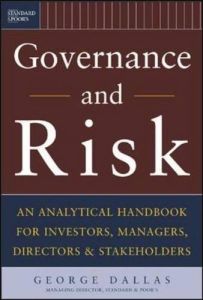Join getAbstract to access the summary!

Join getAbstract to access the summary!
George Dallas
Governance and Risk
An Analytical Handbook for Investors, Managers, Directors & Stakeholders
McGraw-Hill, 2004
What's inside?
Corporate governance has real financial impact — investors pay a premium for good governance and demand a discount for bad.
Recommendation
This may be the most thorough and methodical exposition of corporate governance and risk management now available. It is hard to imagine a facet of the subject this book does not address. Sustainable development, cross-border governance issues, directors’ and officers’ insurance, theory, practice - it’s all here. The book does not aspire to be anything but comprehensive and factual. The section authors, each an expert in his or her subject, eschew any pretense of courting the reader with easy-to-read prose. They write not for the casual reader or the educated lay person, but for the professional with a consummate need to know the subject. That said, getAbstract.com believes this book should be part of every major corporate or business school library; it will have a long shelf life.
Summary
About the Author
George S. Dallas is managing director and global practice leader of Standard & Poor’s Corporate Governance Services unit.


















Comment on this summary